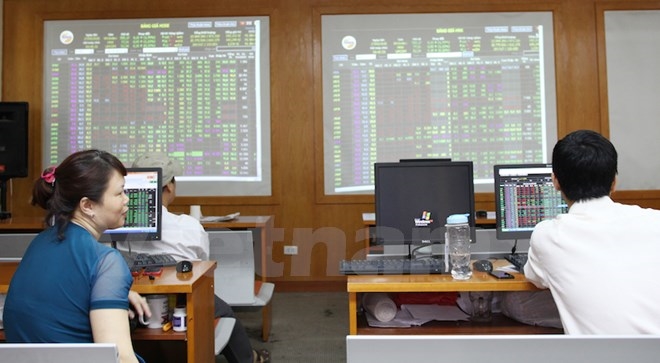 Economy
Economy

With bad business results, stocks of some firms were trading at just half or one third of a glass of iced tea priced at VNĐ3,000 (13 US cents). However, some investors still seek their luck in such penny stocks.
 |
| The local trend is that the VN-Index was for the first time this year rising above 600 points, and some investors continue to hold onto their "iced tea" stocks, waiting for a miracle that will push their prices up.— VNA/VNS File Photo |
HÀ NỘI — With bad business results, stocks of some firms were trading at just half or one third of a glass of iced tea priced at VNĐ3,000 (13 US cents). However, some investors still seek their luck in such penny stocks.
The local trend is that the VN-Index was for the first time this year rising above 600 points, and some investors continue to hold onto their "iced tea" stocks, waiting for a miracle that will push their prices up.
When asked about basic indicators to buy stocks such as EPS (earnings per share) or P/E (price/ earnings per share), most investors said they never buy such penny stocks because bad business results from the firms would never lift their stock price.
However, in some cases, there were winners. Nguyen Hoang Son, an investor in HCM City said he earned VNĐ200 million from just Resources JSC (TNT) stocks. Son bought those stocks at VNĐ4,000 each which he then sold for VNĐ14,000.
The shares have increased more than 10-fold from VNĐ2,500 in 2015. Son earned far from what he could have expected with a profit margin of 250 per cent.
Another investor in HCM City bought Dream House JSC (DRH) at VNĐ6,000 last year, and sold them when they reached VNĐ 23,600 in early January, pocketing nearly VNĐ100 million. She still regrets selling too soon as the shares are now worth VNĐ45,000.
These two examples are among those that can encourage investors, especially those with tiny budgets, to spend on the local penny stocks despite those stocks receiving officially warnings due to accumulated losses from issuing firms.
However, according to Nguyễn Thị Ngân Tuyền, head of the analysis section at Maybank Kim Eng Securities JSC, who has experience with penny stock followers, winners in the field could be counted on fingers. She said normally, low prices reflected firms’ continuous losses or even more serious problems, so in most the cases, investors would lose when prices went down.
According to stock market statistics, the number of stocks trading below par value (VNĐ10,000 each) on the Ha Noi Stock Exchange (HNX) was 171 out of a total of 367. Of which, 65 stocks were trading below VNĐ5,000, 25 stocks were traded below VNĐ3,000 dong, and 10 shares were traded below VNĐ2,000 each.
Also, having more than 60 codes traded at penny prices, low-price stocks in the HCM Stock Exchange still maintained liquidity while most of the penny stocks in the northern bourse failed to have any liquidity for months.
Nguyễn Hoàng Hải, General Secretary of the Vietnam Association of Financial Investment (VAFI), said investors should be very careful of very low price stocks as they reflected the health of the business. They should learn about the health of the firms carefully from their financial statements and check their transparency of business information before buying.
He warned that those investors with “no experience in the market” would be most disadvantaged.
Some leaders of the HoSE, would strengthen the disclosure activities of firms in the future to help local investors grasp the situation of issuers of stocks they might buy. They would require all listed firms to explain and clarify all the required information for transparency. Those firms with continuous losses would be delisted in the bourse. — VNS




